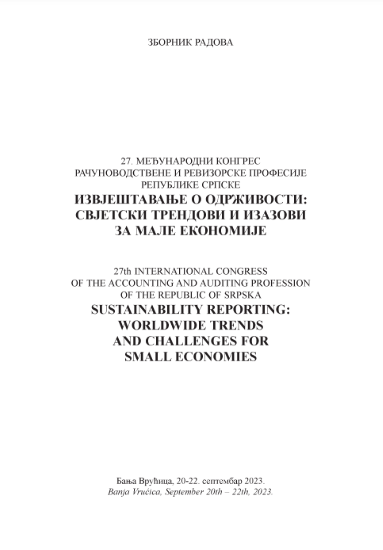ПРИСТУП РЕВИЗИЈИ ФИНАНСИЈСКИХ ИЗВЕШТАЈА ЕНТИТЕТА У РЕАЛНОМ И ЈАВНОМ СЕКТОРУ
APPROACH TO AUDITING FINANCIAL STATMENTS OF ENTITIES IN THE REAL AND PUBLIC SECTOR
Author(s): Mirko Andrić, Milan Lakićević
Subject(s): Public Administration, Public Finances, Fiscal Politics / Budgeting, Accounting - Business Administration
Published by: Savez računovođa i revizora Republike Srpske
Keywords: financial reporting; entities in the real and public sectors; audit of entities in the real sector; audit of budget users;
Summary/Abstract: In this paper, we consider financial statements from the perspectives of individuals, entities in the private and public sectors, and the government, as the necessity to draw a line on a specific day within the same time frame and assess the effects of individual or business decisions. As known, the form and content of financial statements are regulated by law, as well as the date on which they are mandatory to be prepared and disclosed. So we have financial statements for economic companies and cooperatives, as well as for large, medium, and small entities in the economy, and the form and content of financial statements for micro-legal entities. Additionally, there are financial statements for banks and insurance companies, and financial statements for users of budgetary funds. All financial statements should have the characteristic of truthfulness and objectivity, which is ensured and guaranteed by responsible individuals within the entity, and the confirmation of the same is expressed by the authorized auditor. The paper provides a personal reflection on the approach to the audit of financial statements of entities in the economy, public enterprises, and budget users. In the literature on auditing, there is a definition:,, Audit is big business. “Practice shows that it is for some and not for others. In practice, auditing is perceived in several ways: a legally imposed obligation, an unnecessary cost, yet another control that annoys, a necessity that demonstrates the truthfulness and objectivity of financial statements, or a benefit for decision-makers. Perhaps it’s a bit of everything.
- Page Range: 65-81
- Page Count: 17
- Publication Year: 2023
- Language: Serbian
- Content File-PDF

